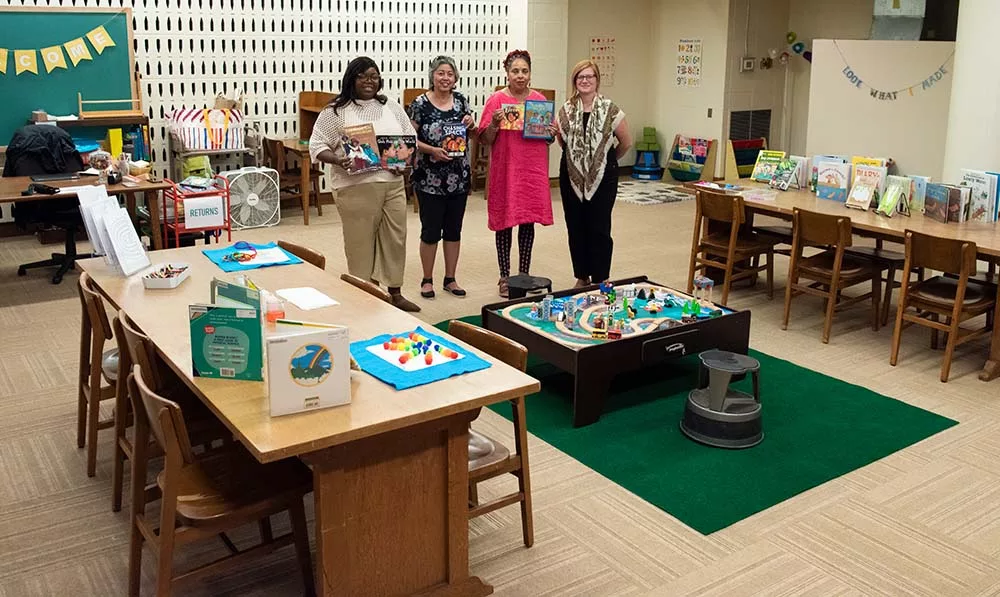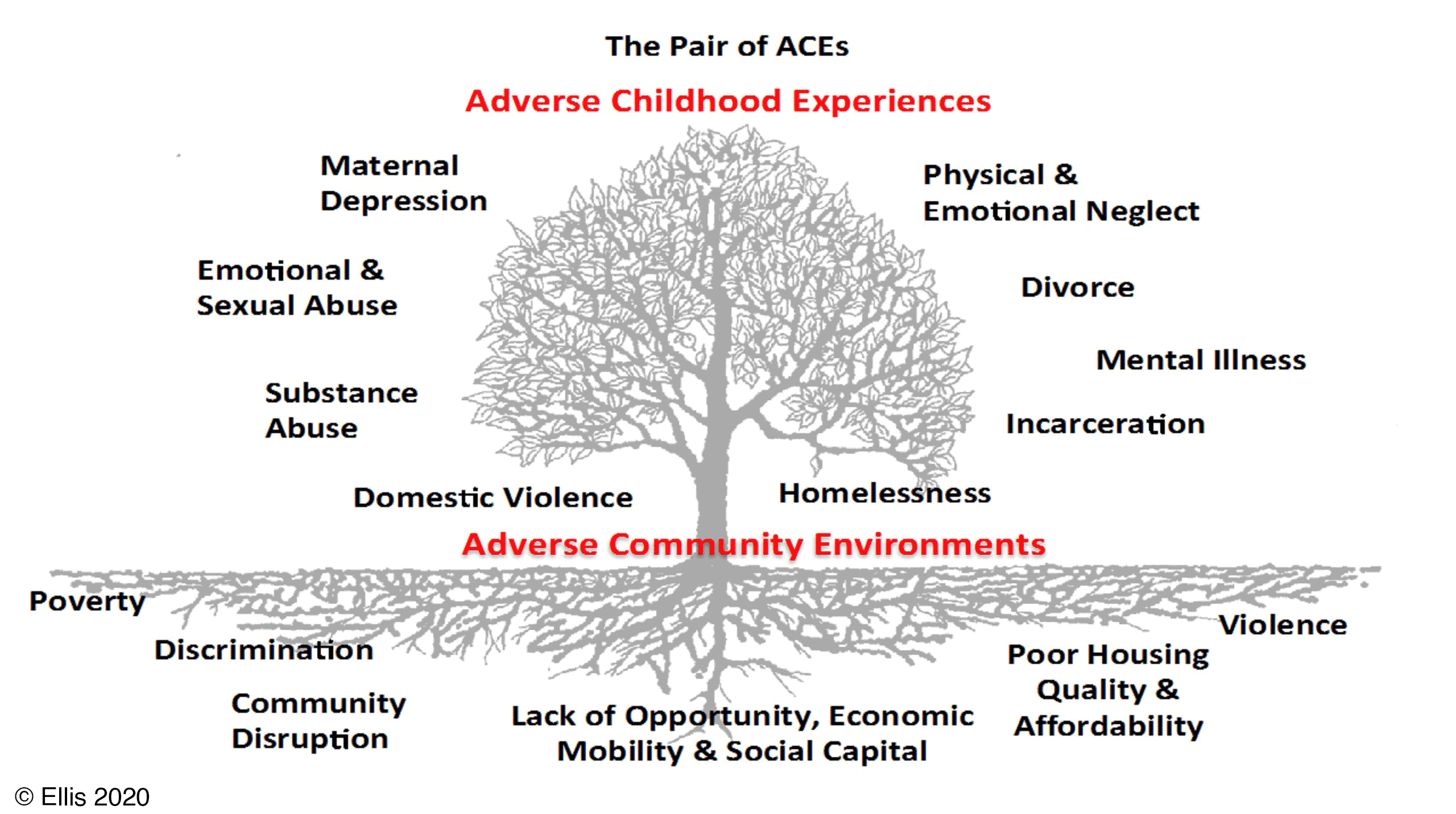Welcome to the Research Initiative on Adverse Childhood Experiences (ACEs) and Trauma at Trinity Washington University

Theme for 2022-2023
Truth, Equity and Healing: Developing a Trauma Responsive Platform to Build Community Resilience
Truth and Equity and the Counseling Research Team on Adverse Childhood Experiences and Trauma
Ida B. Well (1862-1931), journalists and activists stated, “The way to right wrongs is to turn the light of truth upon them.” Therefore, there is a need for truth telling, reconciliation and healing. The Trinity Counseling Program will be a leader and a partner with the Center for Community Resilience/Building Community Resilience (CCR/BCR) out of The George Washington Milken Institute of Public Health program to begin this truth telling process in the District of Columbia. The Truth and Equity initiative description and purpose is as follows (Ellis, W. 2022):
The dual pandemics of structural racism and COVID-19 have reinforced the critical need to confront, reconcile, and repair the damage created by our nation’s legacy of racial oppression. Across sectors—including housing, public education, and criminal justice—inequity in policies and practices have created disparate outcomes in the health, wellbeing, and economic prosperity of communities of color. In the wake of the national reckoning that followed the murders of George Floyd, Breonna Taylor, and Ahmaud Arbery, the Center for Community Resilience (CCR) began a process of truth-telling to fill a knowledge gap regarding the extent to which structural racism exists in U.S. systems and the brutal inequalities produced for communities of color. Healing racial trauma begins with truth, as has been demonstrated by Truth and Reconciliation processes in South Africa, Canada, and New Zealand. CCR builds upon these examples with the knowledge that repair must be achieved through a process focused on equity, that produces policy changes with measurable outcomes. Our process of Truth & Equity produces a framework for accountability to sustain systems transformation. OUR APPROACH CCR’s approach is rooted in cross-sector collaboration.
Using the Building Community Resilience process, local coalitions will be guided through key activities that build social cohesion across racial, economic, and social divides. Our approach includes: • Truth-Telling. Creating a shared understanding of the history of racial oppression and building a new narrative around the root causes of racial inequity to create a common vision for systems transformation. • Community Engagement. Developing and facilitating community engagement opportunities that foster racial healing and community building. • Systems Change. Developing and implementing a community-driven policy agenda for systems transformation through policy analysis, advocacy training, and measurable outcomes for accountability. Our process of Truth & Equity (T&E) provides a trauma-informed platform for communities to understand and discuss structural racism, cultivates cross-racial empathy and social cohesion, and fosters skill-building that enables community members to organize and advocate for racial and economic equity. By fostering political will, a coalition of community stakeholders can pinpoint policy and funding opportunities that support racial equity with specific indices to measure systems change.
THE OPPORTUNITY: WASHINGTON, DC In the District of Columbia, structural racism describes the enduring scaffolding that upholds and systematically produces negative outcomes for the city’s communities of color. Close to 90% of children living in poverty are Black, and one in 10 Latino residents, lives below the poverty line. The ongoing COVID19 pandemic has only exacerbated longstanding inequities by race. For instance, while DC’s Black residents make up 45% of the population, they account for more than half of COVID-19 cases and 75% of COVID deaths. Most of the deaths (60%) occurred in Wards 7 and 8, the areas with the city’s highest concentration of poverty, violence, and Black residents—and the lowest vaccination rates.
Latinos account for the majority (51%) of residents who became newly food-insecure since March 2020. Exclusion of undocumented residents from federally funded cash assistance programs has left the city’s immigrant population struggling to cover basic needs such as housing and transportation. DC’s lack of statehood is also an historical contributor to systemic oppression, disempowering the city’s residents from full representation and participation in the nation’s democratic process. To effectively dismantle the scaffolding that produces inequitable outcomes for the District’s communities of color, we must fully identify and address systemic racism as a root cause of disproportionate community burden and political marginalization.
Our T&E process provides cross-racial partners the opportunity to understand that which has caused harm, commit to change, dismantle systems of structural racism with the aim of fostering equity and building community resilience. The DC Truth & Equity work will build upon what we have learned through our efforts in Cincinnati, as well as the existing relationships and credibility developed during our seven years of Building Community Resilience in the District. The effort presents a timely opportunity to hold space for and facilitate healing from the collective trauma of COVID-19 and longstanding disparity, while fostering examination of the patterns of structural racism that has plagued communities of color. With policy and systems transformation as the end goal, we work closely with community to co-create an advocacy agenda that outlines a policy plan to address issues that negatively impact the health, wealth and wellbeing of DC children and families including gentrification, community violence, and the region’s growing wealth and income gap.
Beginning this academic year, candidates will be leaders and partners in the Truth and Equity processes, and will be exploring the issues of truth, equity, resilience, and healing through class assignments, attending, and participating in the annual October professional development; participating in campus discussions about the book selected for Trinity Reads, reading the 1619 Project document in selected courses; and in April contributing and participating in the culminating event sponsored by the Counseling Programs. According to Iya Affo (2022), “Like trauma, healing and benevolence can be passed from one generation to the next. When we restore cultural identity and live with a regulated stress response, we all have the opportunity for self-realization and a full express of resilience even in the face of adversity” (PACES.com).
Background
The ACEs and Trauma Research Initiative resides in the Counseling/Mental Health Programs of the School of Nursing and Health Professionals at Trinity Washington University. The Research Team has found that too many professionals working with children, youth, and their caregivers and parents have not been informed and educated about Adverse Childhood Experiences (ACEs), childhood trauma and the long-term physical and mental health ramifications of adversity and trauma.

The Rose That Grew From Concrete
Did you hear about the rose that grew
from a crack in the concrete?
Proving nature’s law is wrong it
learned to walk without having feet.
Funny it seems, but by keeping its dreams,
it learned to breathe fresh air.
Long live the rose that grew from concrete
when no one else ever cared.
-Tupac Shakur
Theoretical Orientation
Our theoretical framework is based on the transformative theoretical framework and model of Building Community Resilience (BCR) that addresses the pair of ACEs—Adverse Childhood Experiences and Adverse Community Environments—there is a need for buffers to build resilience that “build and strengthen community supports that support resilience and can prevent or alleviate the pair of ACEs on individuals and entire communities” (Ellis & Dietz, 2017, p. 587).

History of the Research Initiative on ACEs and Trauma
Beginning with the 2014-15 academic year, the faculty in the counseling and education programs decided to focus more intently on the numerous challenges that children and their families were encountering in the District of Columbia (D.C.) and the metropolitan area and examine how these challenges impacted the education and mental health of children in the public school system. Traditional studies have focused on income disparity, public schools that continue to fail, the marginalization of students of color and disabilities, and on students who come from low-income households. A significant failure has been that school systems and various government entities have not recognized the full extent and impact that poverty and associated trauma has on the developing brain.
In the spring of 2018, a core group of faculty began researching the topics of adverse childhood experiences, toxic stress, and trauma. The research group began examining the evidence based research related to the long-term effects of toxic stress and trauma on overall well-being. Research, conducted by Dr. Jack Shonkoff at the Center on the Developing Child at Harvard University, has shown that children who have prolonged exposure to stress show changes in the circuitry of the brain that affects the development of executive functioning skills (Shonkoff, 2017). Human beings are programmed with a fight or flight response to respond quickly in dangerous situations. However, for children who have experienced several “adverse childhood experiences” and long-term exposure to stress, their brains continue to produce cortisol even in the absence of a real threat that might require the fight or flight response.
Research has demonstrated that if the proper interventions are not in place, there are long-term impacts on the overall health and wellbeing of individuals into adulthood. Children who have adverse childhood experiences and develop toxic stress without appropriate interventions will become adults who are more likely to have higher rates of debilitating diseases such as diabetes, asthma, and heart disease (WHO, 2014). Adverse childhood experiences, toxic stress, trauma, and their effects are preventable. The brain’s plasticity and children’s ability to adapt and grow allow for the possibility of “post-traumatic growth” (Tedeschi & Calhoun, 2004). By developing proactive systems of support, schools, health providers, and others are able to counteract trauma.
Given the pervasive issues of: homelessness, unstable family relationships, poverty, food insecurity, physical, sexual and emotional abuse, exposure to violence, and racial and ethnic inequality as experienced by some children, youth and their families in the District of Columbia and the metropolitan area, local pre-K-12 schools and post-secondary institutions must be able to respond effectively to the effects of trauma. While some schools and school systems describe themselves as ‘trauma-informed”, members of the research team, in discussion with local principals, mental health professionals and educators, have determined that many of the professional staff in schools have not been educated nor informed about ACEs and trauma and if they have, the systems are not in place to proactively address issues related to trauma.
Members of the Research Team
- Dr. Cynthia Greer, Lead faculty for Research Initiative on ACEs and Trauma
- Dr. Luane Oprea, Faculty for Research Initiative on ACEs and Trauma
- Destinee Smith, Research Initiative on ACEs and Trauma
- Dr. Deneen Robin, Director of Clinical training for the Counseling Graduate Program
Funding Provided By
